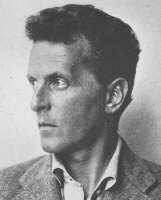Difference between revisions of "Ludwig Wittgenstein"
TexasJamesP (Talk | contribs) m (→Two "Wittgenstein"s) |
Conservative (Talk | contribs) (→Two "Wittgenstein"s) |
||
| Line 11: | Line 11: | ||
Wittgenstein wrote the ''Tractatus Logico-Philosophicus'' (1922) and ''Philosophical Investigations'' (1953) amongst other things; both concerned with the intersection of [[logic]] and [[language]] (Analytic philosophy). | Wittgenstein wrote the ''Tractatus Logico-Philosophicus'' (1922) and ''Philosophical Investigations'' (1953) amongst other things; both concerned with the intersection of [[logic]] and [[language]] (Analytic philosophy). | ||
| − | Philosophers often refer to an "early" and "late" Wittgenstein as a result of the dichotomy between the views presented in the two works. The ''Tractatus'' put forward a view akin to [[Logical positivism |Logical Positivism]] of complex propostions being constructed from basic "atomic" facts by the operation of logic. The Wittgenstein in the ''Tractatus'' attempted to get people to stop doing philosophy as such. He felt that since one cannot properly discuss the disciplines of metaphysics, theology, or anything predicated upon them, in the language of atomic facts and logical operators, one ought not discuss them at all. He concludes his ''Tractatus,'' thusly, " 6.54, My propositions are elucidatory in this way: he who understands me finally recognizes them as senseless, when he has climbed out through them, on them, over them. (He must so to speak throw away the ladder, after he has climbed up on it.) He must surmount these propositions; then he sees the world rightly. 7, Whereof one cannot speak, thereof one must be silent." | + | Philosophers often refer to an "early" and "late" Wittgenstein as a result of the dichotomy between the views presented in the two works. The ''Tractatus'' put forward a view akin to [[Logical positivism |Logical Positivism]] of complex propostions being constructed from basic "atomic" facts by the operation of logic. The Wittgenstein in the ''Tractatus'' attempted to get people to stop doing philosophy as such. He felt that since one cannot properly discuss the disciplines of metaphysics, theology, or anything predicated upon them, in the language of atomic facts and logical operators, one ought not discuss them at all. He concludes his ''Tractatus,'' thusly, " 6.54, My propositions are elucidatory in this way: he who understands me finally recognizes them as senseless, when he has climbed out through them, on them, over them. (He must so to speak throw away the ladder, after he has climbed up on it.) He must surmount these propositions; then he sees the world rightly. 7, Whereof one cannot speak, thereof one must be silent."[http://www.kfs.org/~jonathan/witt/tlph.html] |
Revision as of 09:32, June 1, 2011
Ludwig Josef Johann Wittgenstein (Vienna, 1889 - 1951) was an Austrian philosopher, the most influential of the twentieth century. He was pupil of Bertrand Russell and received the influence of Arthur Schopenhauer and Gottlob Frege.
Raised in a prominent Viennese family, Ludwig Wittgenstein studied engineering in Germany and England, but became interested in the foundations of mathematics and pursued philosophical studies with Moore at Cambridge before entering the Austrian army during World War I... Wittgenstein had a lifelong interest in religion and claimed to see every problem from a religious point of view, but never committed himself to any formal religion. [1]
Two "Wittgenstein"s
Wittgenstein wrote the Tractatus Logico-Philosophicus (1922) and Philosophical Investigations (1953) amongst other things; both concerned with the intersection of logic and language (Analytic philosophy).
Philosophers often refer to an "early" and "late" Wittgenstein as a result of the dichotomy between the views presented in the two works. The Tractatus put forward a view akin to Logical Positivism of complex propostions being constructed from basic "atomic" facts by the operation of logic. The Wittgenstein in the Tractatus attempted to get people to stop doing philosophy as such. He felt that since one cannot properly discuss the disciplines of metaphysics, theology, or anything predicated upon them, in the language of atomic facts and logical operators, one ought not discuss them at all. He concludes his Tractatus, thusly, " 6.54, My propositions are elucidatory in this way: he who understands me finally recognizes them as senseless, when he has climbed out through them, on them, over them. (He must so to speak throw away the ladder, after he has climbed up on it.) He must surmount these propositions; then he sees the world rightly. 7, Whereof one cannot speak, thereof one must be silent."[2]
In contrast in the Investigations Wittgenstein denied the simplicity of the Tractatus and explored the complexities of language and meaning.
